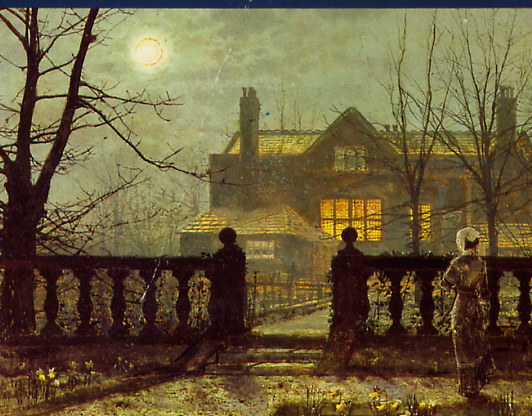I never intended to be a Romanticist, and I certainly never trained to be one. You will say, "But you must have expected to get a job as a Romanticist!" This is true. But I never intended to be a Romanticist: I intended to be a Byronist. Which is to say, I never spent much time studying the other Romantics. In fact, to be honest with you, I never spent much time at the beginning studying Byron's works, either. What I originally wanted to do was look at fandom and Byron, at those who became Byron's fans and why. You can see how this might not involve reading much of Byron's work, particularly since Byron's popularity was to a huge extent dependent on his looks. It came as a rather nasty shock to me to discover, around the middle of my Ph.D. work, that I was actually going to have to
read the poetry. Fortunately, it turned out to be great. It would be impossible for me not to love a man who could write, "He comes at last, in sudden loneliness" (look at the way that "sudden" changes the whole tenor of "loneliness," rendering it sorrowful and sympathetic, imposed rather than taken up), or one who could write, "he...became / A renegado of indifferent fame" (look at that "indifferent"! Ooo, ouch. "He was an okay pirate, not terribly well-known." This denies him even the definitiveness of being a renegado of negative fame: he can't even manage to be
spoken of with contempt). But a man who could write
both those lines? I was always going to love him.
So imagine my delight as I discover (again) that I love the rest of the Romantics, too! Last Thursday we did William Blake. Well, I already knew I loved him, but I forgot how much. It's not "The Lamb" and "The Tyger," although those are good, too. It's the ones like "The Chimney Sweeper":
When my mother died I was very young,
And my father sold me while yet my tongue
Could scarcely cry, 'weep! 'weep! 'weep!
So your chimneys I sweep, and in soot I sleep.
There's little Tom Dacre, who cried when his head,
That curled like a lamb's back, was shaved: so I said,
"Hush, Tom! never mind it, for when your head's bare,
You know that the soot cannot spoil your white hair."
And so he was quiet, and that very night
As Tom was a-sleeping, he had such a sight, -
That thousands of sweepers, Dick, Joe, Ned, and Jack,
Were all of them locked up in coffins of black.
And by came an angel who had a bright key,
And he opened the coffins and set them all free;
Then down a green plain leaping, laughing, they run,
And wash in a river, and shine in the sun.
Then naked and white, all their bags left behind,
They rise upon clouds and sport in the wind;
And the angel told Tom, if he'd be a good boy,
He'd have God for his father, and never want joy.
And so Tom awoke; and we rose in the dark,
And got with our bags and our brushes to work.
Though the morning was cold, Tom was happy and warm;
So if all do their duty they need not fear harm.
You think - or maybe just hope - it will go differently. You think the angel will come and bring him enlightenment, or soothe him. And of course that's what Blake wants you to think, and/or to hope. Or you think it'll all be at the level of that obvious and coercive "'weep, 'weep." But it isn't. Instead, there's the terrible poignancy of that little boy seeing as an advantage a shearing that's in fact purely in the service of furthering misery (this, the author of "The Lamb" tells you, is what really happens to lambs); there's the awful moment at the end when you see that they've all been suckered in, that they've been indoctrinated to their life that's like a living death, locked up in those chimneys, by the belief that capitulating willingly to that life will bring them some reward. And who would have thought one man to have so much irony in him? As I said to the kids, Blake just makes you want to go out and punch a factory owner. His stuff is so wonderful. Even when he's crazy as a bedbug, he's still wonderful ("looking east between the clouds & the waves, we saw a cataract of blood mixed with fire, and not many stones throw from us appear'd and sunk again the scaly fold of a monstrous serpent; at last to the east, distant about three degrees appear'd a fiery crest above the waves; slowly it reared like a ridge of golden rocks till we discover'd two globes of crimson fire, from which the sea fled away in clouds of smoke, and now we saw, it was the head of Leviathan").
And then today we did Coleridge. No Blake, but still...mmm, yum. Of course we did The Rime of the Ancient Mariner. That whole poem could fall off the earth, and as long as the lines "a thousand, thousand slimy things/ Lived on; and so did I" remained, it would be a worthwhile addition to English literature. Look at how its form tells you how awful the speaker is: that heavy spondee at the end to show you what his life is like, and what he's like. Then that repetition of "thousand": the sense that the horrible things are endless, that they crowd the vision and the sea (not to mention the excellent choice of "slimy"). And maybe best of all - or at least best after the metre - the structure of the sentence: the way that tiny pause at the semi-colon makes you wait ("Yes? Yes?"); the way the choice to put "and so did I" last tells you precisely what he's like, the link backward showing you how contemptible he is (no renegado of indifferent fame here). That in a poem that also contains the line, "Hold off! Unhand me, grey-beard loon!" and shows you the arbitrariness of life (I shot the albatross motivelessly; I am the least deserving to live on that boat, and yet I am the only survivor). And that's only the earliest of the poems we studied. To paraphrase Daniel Cleaver in Bridget Jones ("Fuck me, I love Keats"), fuck me, I love Coleridge.
And I do, you know. I love the way he clutches his misery to him, turning it slowly, peeling back its many layers with minute attention and fascination, revelling in it even as he expounds upon its miserable effects, anatomising it even as that anatomisation increases it. I don't know why I love that; I don't. But I do.
And we haven't even got to Keats yet.
Today's photo is from my friendly neighborhood superstore:
That's right, they're right there amidst the vacuum cleaners (which you can just see in the back on the left) and the house paint (which was behind me as I took the photo - not to say took the shot). It actually took me a little while to find the, and while I was wandering in search I entertained a brief (and to me amusing) fantasy of going up to a salesperson and saying, "Excuse me, could you direct me to your Murdering Things aisle?" Didn't do it, though. Although I did disturb the man behind the counter: I wondered if he thought I was some kind of very very low-expectation terrorist. A terrorist of indifferent fame, if you will.




 incidentally). And indeed I did sew in the placket, but once I'd done that I figured I might as well attach the sleeve, and once I'd done
incidentally). And indeed I did sew in the placket, but once I'd done that I figured I might as well attach the sleeve, and once I'd done 



















